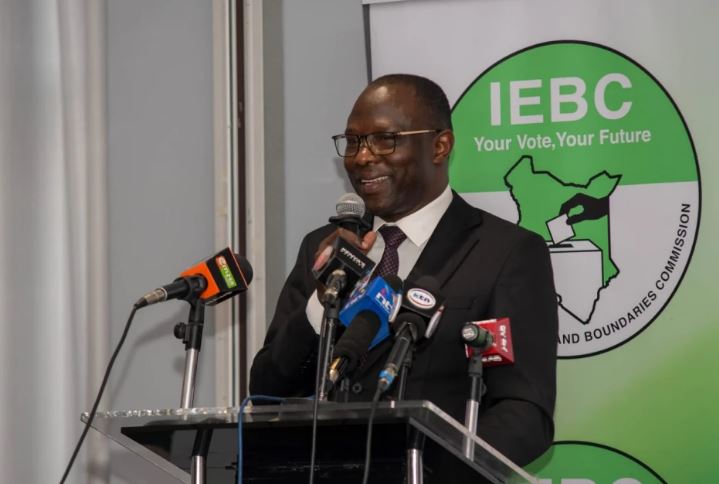
 IEBC Chairperson Erastus Ethekon speaks at a media breakfast on August 6, 2025. PHOTO | IEBC
IEBC Chairperson Erastus Ethekon speaks at a media breakfast on August 6, 2025. PHOTO | IEBC
The Independent Electoral and Boundary Commission (IEBC) can still shrug off mistrust issues and print ballot papers locally.
Busia Senator Okiya Omatatah says the electoral agency cannot hang on to the lack of trust not to have the ballots printed locally.
He argues that the controversy surrounding mistrust in elections is about counting and result declarations and not printing of ballots.
“The issue in Kenya is that elections are manipulated at the tallying and declaration stage, not at the ballot printing level. No one rigs using the ballot printing process,” he said.
The legislator wondered why Kenyans will trust fellow citizens to conduct the elections, including as returning and presiding officers, and yet the same people will not contemplate locals printing ballot papers. In any case, Omatatah argues the country will in the future discard manual voting.
“If we don’t trust locals to print ballot papers, why then do we hire returning and presiding officers who are Kenyans? We should then contract foreigners to collate, tally, and declare results?” Omatatah said.
Former Trade Cabinet Secretary Moses Kuria says the country incurs unnecessary high costs for running elections due to the mistrust but believes that can be addressed.
“We can afford to print ballot papers locally and reduce the cost. We can also manage elections with a lean IEBC and thus safe taxpayers millions of shillings,” Kuria says.
Ironically, Kenya, being East Africa’s biggest economy, has been unable to print the ballot papers in locally not due to incapacity but trust deficit. This has hampered the competitiveness of local manufacturers to bid both at the regional and international levels.
IEBC is among agencies that have been unable to implement the local content policy, which requires that international firms bidding for jobs have either ownership of Kenyans or partner with a Kenyan firm to do part of the work.
In Uganda, for instance, the Electoral Commission has reserved part of the printing work exclusively for local providers in a bid to promote local industry and build capacity for this year’s general elections.
On June 10, 2025, Uganda’s EC issued an Addendum No.1 to all eligible bidders for tender No. EC/SUPLS/2024-2025/00489/1/2/3/4/5/6/7/8/9/10 clarifying that Lots 4,5 and 10 has been reserved for local providers in line with PPDA guideline 12/2024.
Speaking in an interview with Citizen TV on Monday morning, IEBC member Alutulala Mukhwana said the issue of trust has deep historical roots.
"The issue of trust is historical, dating back to the 1992 multi-party elections, and cannot be attributed to this commission alone," he said.
Last week, IEBC chairman Erastus Ethekon told MPs that he will be the happiest man if Kenyans sit and agree on the need to have the ballot papers printed locally.
The IEBC chairman was responding to a question by Borabu MP Patrick Osero, who wondered by the commission was unable to source local printers given that more sensitive documents such as currency has been printed locally.
“The day we will call ourselves Kenyans and resolve that we can print the ballots at home or even use the government printer, then that day we will celebrate. But as things stand, we have a trust deficit,” Ethekon said.
Ethekon said due to mistrust, Kenyan ballot papers have more security features than even our currency, thus making it more expensive than even printing paper money.
“One ballot carries more than 11 security features. That's what trust deficit brings to us,” Ethekon told MPs last Thursday.
In 2022, IEBC said it costs about Sh23 to print one ballot paper. This meant that Kenya spent about Sh3.4 billion in the last election to print over 120 million ballot papers for the six electoral seats.
In 2027, IEBC CEO Hussein Marjan Hussein told MPs that the commission will spend about Sh5.9 billion in printing ballot papers out of an estimated Sh57.3 billion required to conduct the next general elections.
The commission had initially requested Sh61 billion, but the figure was rationalized down to Sh57.3 billion.
The Sh57.3 billion budget includes Sh2.5 billion for stakeholder engagement, Sh1.4 billion to media campaigns, Sh1 billion for legal reforms, Sh8 billion for continuous voter registration and Sh5.9 billion for ballot printing.
Other areas are staff training (S3.9 billion), transport (Sh4.1 billion), system maintenance (Sh2.4 billion) and simulation exercises (Sh1 billion).














